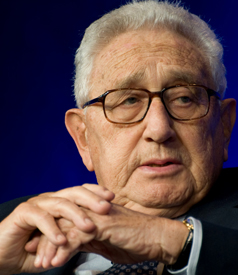Kissinger's Truth
Friday 04 June 2010
One of the most fascinating phenomena in the lives of public servants is the difference between what they permit themselves to say while in harness and what they can safely say after they retire.
As the 87-year-old Henry Kissinger remarked in the documentary film "Nuclear Tipping Point," "For me the most searing question was what I would actually tell the president if he turned to me and said, 'I've done everything I can in the diplomatic field and my only option now is to use nuclear weapons.' Of all of the decisions that were before me, this was the most haunting one." He goes on to say, "I tried to apply traditional diplomatic principles to a world with nuclear weapons. And I found it, I would say, impossible to do." Whatever we may think about Dr. Kissinger's lifetime of diplomatic subterfuge, these statements have the authoritative ring of hard-won wisdom.
Those still in office can ill-afford such frankness. When President Reagan proposed to Mikhail Gorbachev in Reykjavik that the United States and the Soviet Union get rid of all their nuclear warheads, the people around the president thought that surely senility had set in and hastened to cover for him.
The interests of all states in the present paradigm of international relations require that their officials put up a constant front of threat in order to maintain credibility. Any deviation will be seen as an invitation not only for adversaries beyond their borders, but even domestic political opponents, to take fatal advantage.
Because this is as true for confident superpower democracies like us as it is for paranoid autocracies like Iran, it creates an enormous narrowing in the possibilities of diplomatic initiatives intended to resolve conflicts. The assumption is that the only possible resolution consists in either one side or the other blinking.
So goes the present discourse between the United States and Iran, or the US and North Korea, our South and North Korea, repeating the futile silliness of a schoolyard confrontation, with its primitive and fearful cycle of "you started it," blaming and macho refusal to back off. Dedicated and realistic players like Secretary Clinton carefully refuse to deviate from the message of invincible and self-righteous strength - even though she knows perfectly well that the North Korean sinking of a South Korean ship was preceded some months before by a South Korean attack on a North Korean ship. Just as she also knows that the Iranian government has reasons to feel both threatened and annoyed by international double standards around nuclear weapons.
In the nuclear age, macho posturing from any quarter ought to be seen for what it is, an inadequate response to the immovable reality contained in Dr. Kissinger's helplessness. Within each of the nine nuclear powers, officials subject to the white-hot pressure he endured during the cold war await the unconstraint of retirement to admit the utter vulnerability they surely felt around the possibility of having to make decisions that might result in the incineration of millions, including themselves. They know full well that in the case of nuclear war, the only victory is prevention.
The sober proposal of quintessentially establishment figures like Kissinger, Nunn, Schultz and Perry to move toward realistic, reciprocal processes resulting in the abolition of all nuclear weapons - including the securing against terrorists of loose nuclear materials - is much more of a watershed moment than policy makers have yet admitted. It demonstrates that the choice is not between empty, dangerous threats and wimpitude, but between continuing an obsolete charade and admitting that power in the nuclear age is build upon the bedrock truth that your survival depends upon mine and mine upon yours.
The implications are fundamental, paradigm changing. As the late Adm. Eugene Carroll, who was at one time in charge of all American nuclear weapons, pointed out, ending nuclear war is tantamount to ending all war. In 2010, there are roughly 30 wars being fought around the planet - in places like the Congo, Sudan, Afghanistan and Colombia. While it may seem improbable that such "small" wars could escalate into nuclear war, all war, on whatever scale, is a symptom of a mind-set: "you're either with us or you're against us." Unless we change that mind-set to "we're all in this together," continued international posturing in the present mode points inevitably to nuclear war somewhere ahead.

No comments:
Post a Comment